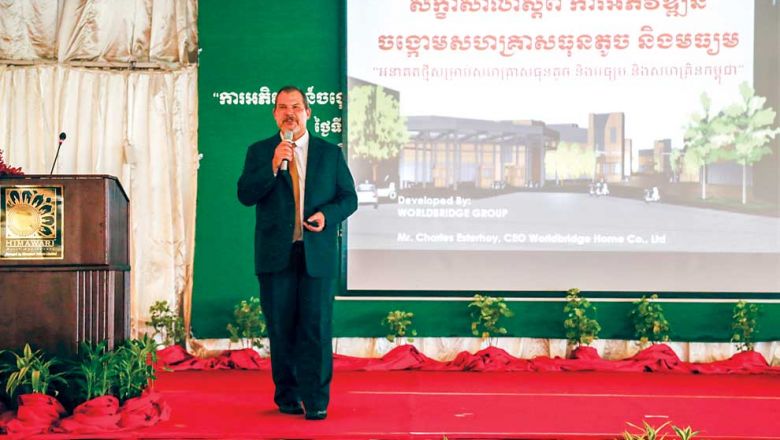The days when cash-strapped factory owners huddled in little smoky corners of their villages to produce consumer products, with limited raw materials, for the local market will be the tales of the past.
a litany of setbacks – from financial constraints, raw material scarcity, lack of technology to transporting finished products to the market – will no longer nag most entrepreneurs who have been toiling in isolation.
An innovative small and medium enterprises (SMEs) cluster park is being developed to help Cambodian SMEs produce high-value goods and link them up with the local supply chain. The primary objective is to create a sustainable and highly productive SME community.
For a start, the cluster will focus on food and beverage industry, as it is easy to source agriculture raw materials and manpower, which could help in reducing transportation costs.
Roughly half-a-million SMEs scattered across the Kingdom is expected to benefit from the new initiative that is based on German Industrial 4.0 model – a strategic initiative to establish Germany as a leading manufacturer.
“SMEs are scattered and located in residential areas, they cause pollution and traffic jams. Some have no idea where to buy raw materials or machinery, and have little knowledge of sanitation,” Kay Seng Hoir, deputy director of the Ministry of Industry and Handicraft, said at the Innovative SME Cluster Development seminar held in Phnom Penh on Tuesday.
The cluster zone, developed by the WorldBridge Group and located on four hectares of land in S’ang district in Kandal province, is earmarked to begin operations in the third quarter of 2019.
Construction of the necessary infrastructure will begin end of this year or early 2019.
“(The) model changes the game. It is not a typical SME cluster, we create a creative and innovative cluster model which itself is an ecosystem.
“Low value output and cheap labour is not suitable for Cambodia and FDI (foreign direct investment) is not interested in QIP (Qualified Investment Project) programs and tax incentives anymore,” said Charles J. Esterhoy, chief executive officer of WorldBridge Homes Co Ltd.
In a way the business model is unique. The SME cluster houses an array of inter-linked business entities – manufacturers, Information Communications Technology (ICT) providers, research and development centre, logistics operators – all with a single objective to produce value added products.
Therefore, Cambodian famers need not fret about selling their agric-products as there will be ready-made demand for their produces. For instance, cassava starch is a potential source in the production of bone replacement implants, hence there is growing demand for the root plant.
Likewise, moringa planters need not merely rely on limited domestic market since moringa leaves used in pharmaceutical products are in great demand as well.
“WorldBridge will provide the innovative platform and this new concept is sustainable by itself. The cluster removes barriers standing in front of entrepreneurs and if these barriers exist, entrepreneurs can’t progress.
“Cambodia has to leapfrog quickly from Industry 2.0 (mass production) to Industry 4.0 (internet of things and services) to produce quality products,” added Esterhoy.
The clustering concept has been successfully implemented in developing countries like the Philippines and Thailand. For instance, in the Philippines, SME operators have experimented with coco, abaca, coffee, rubber and seaweeds.
Similarly in Thailand, farmers and entrepreneurs were involved in SME cluster concept in starch production from cassava and canna roots.
The production model is efficient. Clustering different industry stakeholders helps to develop the value chain, create new jobs, develop skill workforce, improve quality and pricing. But more important it offers sustainable economic returns.
Besides, as the model brings non-agriculture innovators, it helps bolster the rural economy and uplift economic status of farmers in Cambodia, as farm workers will be part of the complex value chain.


Add Comment